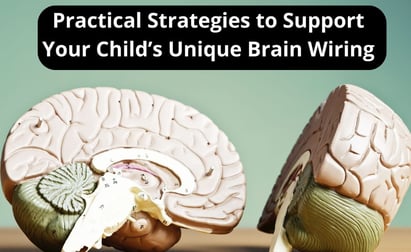Practical Strategies to Support Your Child’s Unique Brain Wiring


You don't have time for superficial fixes. Your child's neurodivergent wiring is a complex system of intricate networks that govern triggers, responses, and signals. To truly help them thrive, you must focus on the root, the leverage points that unlock real change. Here's where you start.
Observe and Document Because Behaviour Is Communication
Stop guessing. Keep a simple journal. When does the challenging behaviour happen? What just occurred? What calms them? Patterns emerge when you track sleep, food, noise levels, lighting, social demands, or transitions. This isn't just for understanding behaviour. It's the blueprint for intervention. It applies equally to neurotypical and neurodiverse children. The goal is to identify the system's weak links and then address them.
Prioritise Sensory Regulation. Know Their Sensory Needs
Please don't hesitate to get generic advice. Your child's sensory system is its universe. Do they need quiet spaces? Deep pressure, such as hugs or weighted blankets? Movement or calming visual input? Proactive, intentional sensory breaks are not optional. They are your best tools for prevention. Use them to stop meltdowns before they start. Your child's ability to self-regulate depends on your mastery of their sensory map.
Simplify and Slow Down. Because chaos doesn't produce clarity
No over-scheduling. There are no rapid transitions. Your child's system needs space to process. Respect their pacing. Build downtime into every day; add a buffer between activities. It's not an indulgence. It's a necessity. Forcing a system to operate at a hyper-speed only causes overwhelm.
Validate Their Experience. Build Trust and Connection
Even if you don't understand why they're upset, accept their reality. Say, "I see you're overwhelmed right now." This isn't coddling; it's anchoring trust. You aren't just managing behaviour. You're listening to their nervous system. That's the only way to respond with compassion, honestly.
Seek Understanding, Not Just Compliance
Ditch the "obedience" mindset. Your job isn't to demand compliance; it's to understand what their system needs to feel safe and regulated. Their behaviour is their language. Learn to speak it. Only then can you avoid reactivity and establish a partnership founded on safety and trust.
Remember: Raising a neurodivergent child is a journey of relentless learning and strategic action. When you see behaviour as signals from a complex wiring system, you empower yourself to respond with compassion. To build a connection that transforms challenges into strengths. Love isn't enough—understanding is. Your love, your patience, and your deep insight are their greatest assets.
References:
Delahooke, M. (2022). Brain-Body Parenting: How to Stop Managing Behaviour and Start Connecting with Your Child Through Co-Regulation. Harper Wave.
